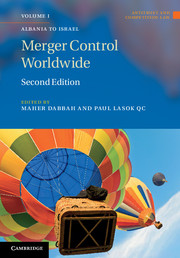Book contents
- Frontmatter
- Contents
- Preface
- List of Contributors
- Table of cases
- Table of Legislation and Official Guidance
- Introduction
- Albania
- Argentina
- Armenia (Republic of Armenia)
- Australia
- Austria
- Barbados
- Belgium
- Bosnia and Herzegovina
- Brazil
- Bulgaria (Republic of Bulgaria)
- Canada
- Chile
- China*
- Costa Rica
- Croatia
- Cyprus (Republic of Cyprus)
- Czech Republic
- Denmark
- Estonia
- European Economic Area
- European Union
- Finland
- France
- Germany (Federal Republic of Germany)
- Greece
- Hong Kong
- Hungary
- Iceland
- India
- Indonesia (Republic of Indonesia)
- Ireland
- Israel
- Italy
- Japan
- Kenya
- Korea
- Latvia
- Lithuania
- Macedonia (Republic of Macedonia)
- Malta
- Mexico
- Netherlands (The Netherlands)
- New Zealand
- Norway
- Pakistan
- Peru
- Philippines (Republic of the Philippines)
- Poland
- Portugal
- Romania
- Russia
- Serbia
- Singapore
- Slovakia (Slovak Republic)
- Slovenia
- South Africa
- Spain
- Sri Lanka
- Sweden
- Switzerland
- Taiwan
- Thailand
- Tunisia (Republic of Tunisia)
- Turkey
- Ukraine
- United Kingdom
- United States of America
- Uzbekistan
- Venezuela
- Zambia
- Index
Taiwan
Published online by Cambridge University Press: 05 November 2014
- Frontmatter
- Contents
- Preface
- List of Contributors
- Table of cases
- Table of Legislation and Official Guidance
- Introduction
- Albania
- Argentina
- Armenia (Republic of Armenia)
- Australia
- Austria
- Barbados
- Belgium
- Bosnia and Herzegovina
- Brazil
- Bulgaria (Republic of Bulgaria)
- Canada
- Chile
- China*
- Costa Rica
- Croatia
- Cyprus (Republic of Cyprus)
- Czech Republic
- Denmark
- Estonia
- European Economic Area
- European Union
- Finland
- France
- Germany (Federal Republic of Germany)
- Greece
- Hong Kong
- Hungary
- Iceland
- India
- Indonesia (Republic of Indonesia)
- Ireland
- Israel
- Italy
- Japan
- Kenya
- Korea
- Latvia
- Lithuania
- Macedonia (Republic of Macedonia)
- Malta
- Mexico
- Netherlands (The Netherlands)
- New Zealand
- Norway
- Pakistan
- Peru
- Philippines (Republic of the Philippines)
- Poland
- Portugal
- Romania
- Russia
- Serbia
- Singapore
- Slovakia (Slovak Republic)
- Slovenia
- South Africa
- Spain
- Sri Lanka
- Sweden
- Switzerland
- Taiwan
- Thailand
- Tunisia (Republic of Tunisia)
- Turkey
- Ukraine
- United Kingdom
- United States of America
- Uzbekistan
- Venezuela
- Zambia
- Index
Summary
Relevant legislation and statutory standards
The Fair Trade Law of 1991 (FTL), the most recent amendments to which were promulgated in February 2002; the Enforcement Rules to the FTL, last revised in June 2002; and the Guidelines for the Handling of Combination Filings, first promulgated in July 2006 (‘the Guidelines’), make up the principal legislation concerning merger and acquisition, unfair competition and monopoly in Taiwan. Article 6 of the FTL places mergers and acquisitions in the broader category of ‘combinations of enterprises’. The 2002 amendments to the FTL and its related Enforcement Rules changed the filing process for combinations from an approval system to a notification system, and the Guidelines introduced a two-tier review system by classifying combination filings into ‘simplified’ and ‘general’ filings.
Decision-making bodies and enforcement authority(ies)
At the national level, the Fair Trade Commission (FTC) is the government authority governing mergers and other types of combination under the FTL. The FTC is empowered to examine and investigate possible infringements of the FTL and to take action against wrongdoers by imposing fines and other penalties. The FTC is also empowered to order the dissolution of any combinations that infringe the provisions of the FTL. The FTC will investigate complaints against combinations that are affected without the consent of the FTC, but may also investigate matters on its own initiative.
- Type
- Chapter
- Information
- Merger Control Worldwide , pp. 1395 - 1405Publisher: Cambridge University PressPrint publication year: 2012



